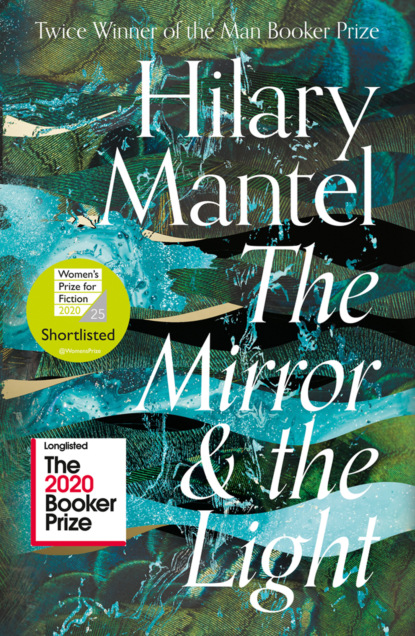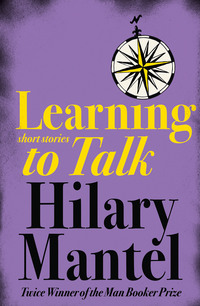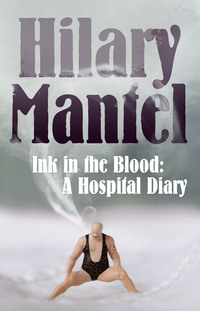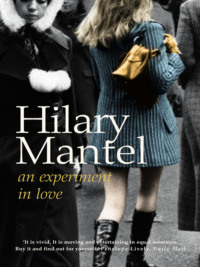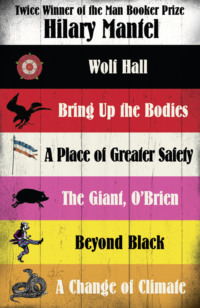
Полная версия
The Wolf Hall Trilogy
‘Thomas Cromwell?’ people say. ‘That is an ingenious man. Do you know he has the whole of the New Testament by heart?’ He is the very man if an argument about God breaks out; he is the very man for telling your tenants twelve good reasons why their rents are fair. He is the man to cut through some legal entanglement that's ensnared you for three generations, or talk your sniffling little daughter into the marriage she swears she will never make. With animals, women and timid litigants, his manner is gentle and easy; but he makes your creditors weep. He can converse with you about the Caesars or get you Venetian glassware at a very reasonable rate. Nobody can out-talk him, if he wants to talk. Nobody can better keep their head, when markets are falling and weeping men are standing on the street tearing up letters of credit. ‘Liz,’ he says one night, ‘I believe that in a year or two we'll be rich.’
She is embroidering shirts for Gregory with a black-work design; it's the same one the queen uses, for she makes the king's shirts herself.
‘If I were Katherine I'd leave the needle in them,’ he says.
She grins. ‘I know you would.’
Lizzie had grown silent and stern when he told her how the king had spoken, at the meeting with Katherine. He had told her they should separate, pending a judgment on their marriage; perhaps she would retire from court? Katherine had said no; she said that would not be possible; she said she would seek advice from canon lawyers, and that he, himself, should equip himself with better lawyers, and better priests; and then, after the shouting was done, the people with their ears pressed to the walls had heard Katherine crying. ‘He doesn't like her crying.’
‘Men say,’ Liz reaches for her scissors, ‘“I can't endure it when women cry” – just as people say, “I can't endure this wet weather.” As if it were nothing to do with the men at all, the crying. Just one of those things that happen.’
‘I've never made you cry, have I?’
‘Only with laughter,’ she says.
Conversation fades into an easy silence; she is embroidering her own thoughts, he is plotting what to do with his money. He is supporting two young scholars, not belonging to the family, through Cambridge University; the gift blesses the giver. I could increase those endowments, he thinks, and – ‘I suppose I should make a will,’ he says.
She reaches out for his hand. ‘Tom, don't die.’
‘Good God, no, I'm not proposing it.’
He thinks, I may not be rich yet but I am lucky. Look how I got out from under Walter's boots, from Cesare's summer, and a score of bad nights in back alleys. Men, it is supposed, want to pass their wisdom to their sons; he would give a great deal to protect his own son from a quarter of what he knows. Where does Gregory's sweet nature come from? It must be the result of his mother's prayers. Richard Williams, Kat's boy, is sharp, keen and forward. Christopher, his sister Bet's boy, is clever and willing too. And then he has Rafe Sadler, whom he trusts as he would trust his son; it's not a dynasty, he thinks, but it's a start. And quiet moments like this are rare, because his house is full of people every day, people who want to be taken to the cardinal. There are artists looking for a subject. There are solemn Dutch scholars with books under their arms, and Lübeck merchants unwinding at length solemn Germanic jokes; there are musicians in transit tuning up strange instruments, and noisy conclaves of agents for the Italian banks; there are alchemists offering recipes and astrologers offering favourable fates, and lonely Polish fur traders who've wandered by to see if someone speaks their language; there are printers, engravers, translators and cipherers; and poets, garden designers, cabalists and geometricians. Where are they tonight?
‘Hush,’ Liz says. ‘Listen to the house.’
At first, there is no sound. Then the timbers creak, breathe. In the chimneys, nesting birds shuffle. A breeze blows from the river, faintly shivering the tops of trees. They hear the sleeping breath of children, imagined from other rooms. ‘Come to bed,’ he says.
The king can't say that to his wife. Or, with any good effect, to the woman they say he loves.
Now the cardinal's many bags are packed for France; his entourage yields little in splendour to the one with which he crossed seven years ago to the Field of the Cloth of Gold. His itinerary is leisurely, before he embarks: Dartford, Rochester, Faversham, Canterbury for three or four days, prayers at the shrine of Becket.
So, Thomas, he says, if you know the king's had Anne, get a letter to me the very day. I'll only trust it if I hear it from you. How will you know it's happened? I should think you'll know by his face. And if you have not the honour of seeing it? Good point. I wish I had presented you; I should have taken the chance while I had it.
‘If the king doesn't tire of Anne quickly,’ he tells the cardinal, ‘I don't see what you are to do. We know princes please themselves, and usually it's possible to put some gloss on their actions. But what case can you make for Boleyn's daughter? What does she bring him? No treaty. No land. No money. How are you to present it as a creditable match at all?’
Wolsey sits with his elbows on his desk, his fingers dabbing his closed lids. He takes a great breath, and begins to talk: he begins to talk about England.
You can't know Albion, he says, unless you can go back before Albion was thought of. You must go back before Caesar's legions, to the days when the bones of giant animals and men lay on the ground where one day London would be built. You must go back to the New Troy, the New Jerusalem, and the sins and crimes of the kings who rode under the tattered banners of Arthur and who married women who came out of the sea or hatched out of eggs, women with scales and fins and feathers; beside which, he says, the match with Anne looks less unusual. These are old stories, he says, but some people, let us remember, do believe them.
He speaks of the deaths of kings: of how the second Richard vanished into Pontefract Castle and was murdered there or starved; how the fourth Henry, the usurper, died of a leprosy which so scarred and contracted his body that it was the size of a mannikin or child. He talks of the fifth Henry's victories in France, and the price, not in money, to be paid for Agincourt. He talks of the French princess whom that great prince married; she was a sweet lady, but her father was insane and believed that he was made of glass. From this marriage – Fifth Henry and the Glass Princess – sprung another Henry who ruled an England dark as winter, cold, barren, calamitous. Edward Plantagenet, son of the Duke of York, came as the first sign of spring: he was a native of Aries, the sign under which the whole world was made.
When Edward was eighteen years old, he seized the kingdom, and he did it because of a sign he received. His troops were baffled and battle-weary, it was the darkest time of one of God's darkest years, and he had just heard the news that should have broken him: his father and his youngest brother had been captured, mocked and slaughtered by the Lancastrian forces. It was Candlemas; huddled in his tent with his generals, he prayed for the slaughtered souls. St Blaise's Day came: 3 February, black and icy. At ten in the morning, three suns rose in the sky: three blurred discs of silver, sparkling and hazy through particles of frost. Their garland of light spread over the sorry fields, over the sodden forests of the Welsh borderlands, over his demoralised and unpaid troops. His men knelt in prayer on the frozen ground. His knights genuflected to the sky. His whole life took wing and soared. In that wash of brilliant light he saw his future. When no one else could see, he could see: and that is what it means to be a king. At the Battle of Mortimer's Cross he took prisoner one Owen Tudor. He beheaded him in Hereford marketplace and set his head to rot on the market cross. An unknown woman brought a basin of water and washed the severed head; she combed its bloody hair.
From then on – St Blaise's Day, the three suns shining – every time he touched his sword he touched it to win. Three months later he was in London and he was king. But he never saw the future again, not clearly as he had that year. Dazzled, he stumbled through his kingship as through a mist. He was entirely the creature of astrologers, of holy men and fantasists. He didn't marry as he should, for foreign advantage, but became enmeshed in a series of half-made, half-broken promises to an unknown number of women. One of them was a Talbot girl, Eleanor by name, and what was special about her? It was said she was descended – in the female line – from a woman who was a swan.
And why did he fasten his affection, finally, on the widow of a Lancastrian knight? Was it because, as some people thought, her cold blonde beauty raised his pulse? It was not exactly that; it was that she claimed descent from the serpent woman, Melusine, whom you may see in old parchments, winding her coils about the Tree of Knowledge and presiding over the union of the moon and the sun. Melusine faked her life as an ordinary princess, a mortal, but one day her husband saw her naked and glimpsed her serpent's tail. As she slid from his grip she predicted that her children would found a dynasty that would reign for ever: power with no limit, guaranteed by the devil. She slid away, says the cardinal, and no one ever saw her again.
Some of the candles have gone out; Wolsey does not call for more lights. ‘So you see,’ he says, ‘King Edward's advisers were planning to marry him to a French princess. As I … as I have intended. And look what happened instead. Look how he chose.’
‘How long is that? Since Melusine?’
It is late; the whole great palace of York Place is quiet, the city sleeping; the river creeping in its channels, silting its banks. In these matters, the cardinal says, there is no measure of time; these spirits slip from our hands and through the ages, serpentine, mutable, sly.
‘But the woman King Edward married – she brought, did she not, a claim to the throne of Castile? Very ancient, very obscure?’
The cardinal nods. ‘That was the meaning of the three suns. The throne of England, the throne of France, the throne of Castile. So when our present king married Katherine, he was moving closer to his ancient rights. Not that anyone, I imagine, dared put it in those terms to Queen Isabella and King Ferdinand. But it is as well to remember, and mention from time to time, that our king is the ruler of three kingdoms. If each had their own.’
‘By your account, my lord, our king's Plantagenet grandfather beheaded his Tudor great-grandfather.’
‘A thing to know. But not to mention.’
‘And the Boleyns? I thought they were merchants, but should I have known they had serpent fangs, or wings?’
‘You are laughing at me, Master Cromwell.’
‘Indeed not. But I want the best information, if you are leaving me to watch this situation for you.’
The cardinal talks then about killing. He talks about sin: about what's to be expiated. He talks about the sixth King Henry, murdered in the Tower; of King Richard, born under Scorpio, the sign of secret dealings, tribulation and vice. At Bosworth, where the Scorpian died, bad choices were made; the Duke of Norfolk fought on the losing side, and his heirs were turned out of their dukedom. They had to work hard, long and hard, to get it back. So do you wonder, he says, why the Norfolk that is now shakes sometimes, if the king is in a temper? It's because he thinks he will lose all he has, at an angry man's whim.
The cardinal sees his man make a mental note; and he speaks of the loose rattling bones under the paving of the Tower, those bones bricked into staircases and mulched into the Thames mud. He talks about King Edward's two vanished sons, the younger of them prone to stubborn resurrections that almost threw Henry Tudor out of his kingdom. He speaks of the coins the Pretender struck, stamped with their message to the Tudor king: ‘Your days are numbered. You are weighed in the balance: and found wanting.’
He speaks of the fear that was then, of the return of civil war. Katherine was contracted to be married into England, had been called ‘Princess of Wales’ since she was three years old; but before her family would let her embark from Corunna, they exacted a price in blood and bone. They asked Henry to turn his attention to the chief Plantagenet claimant, the nephew of King Edward and wicked King Richard, whom he had held in the Tower since he was a child of ten. To gentle pressure, King Henry capitulated; the White Rose, aged twenty-four, was taken out into God's light and air, in order to have his head cut off. But there is always another White Rose; the Plantagenets breed, though not unsupervised. There will always be the need for more killing; one must, says the cardinal, have the stomach for it, I suppose, though I don't know I ever have; I am always ill when there is an execution. I pray for them, these old dead people. I even pray for wicked King Richard sometimes, though Thomas More tells me he is burning in Hell.
Wolsey looks down at his own hands, twists the rings on his fingers. ‘I wonder,’ he murmurs. ‘Wonder which it is.’ Those who envy the cardinal say he has a ring which enables its owner to fly, and allows him to encompass the death of his enemies. It detects poisons, renders ferocious beasts harmless, ensures the favour of princes, and protects against drowning.
‘I suppose other people know, my lord. Because they have employed conjurers, to try to get it copied.’
‘If I knew, I'd get it copied myself. I'd give one to you.’
‘I picked up a snake once. In Italy.’
‘Why did you do that?’
‘For a bet.’
‘Was it poisonous?’
‘We didn't know. That was the point of the bet.’
‘Did it bite you?’
‘Of course.’
‘Why of course?’
‘It wouldn't be much of a story, would it? If I'd put it down unharmed, and away it slid?’
Unwillingly, the cardinal laughs. ‘What will I do without you,’ he says, ‘among the double-tongued French?’
In the house at Austin Friars, Liz is in bed but she stirs in her sleep. She half wakes, says his name and inches into his arms. He kisses her hair and says, ‘Our king's grandfather married a serpent.’
Liz murmurs, ‘Am I awake or asleep?’ A heartbeat, and she slides away from him, and turns over, throwing out an arm; he wonders what she will dream. He lies awake, thinking. All that Edward did, his battles, his conquests, he did with Medici money behind him; their letters of credit were more important than signs and wonders. If King Edward was, as many people say, not the son of his father at all, not the son of the Duke of York; if King Edward's mother, as some people do believe, had bred him from an honest English soldier, an archer called Blaybourne; then if Edward married a serpent woman, his offspring would be … Unreliable, is the word that comes to mind. If all the old stories are to be believed, and some people, let us remember, do believe them, then our king is one part bastard archer, one part hidden serpent, one part Welsh, and all of him in debt to the Italian banks … He too slides, drifts towards sleep. His accounting fails; the spectral world moves in, where pages of figures used to be. Try always, the cardinal says, to learn what people wear under their clothes, for it's not just their skin. Turn the king inside out, and you will find his scaly ancestors: his warm, solid, serpentine flesh.
When in Italy he had picked up a snake for a bet, he had to hold it till they counted ten. They counted, rather slowly, in the slower languages: eins, zwei, drei … At four, the startled snake flicked its head and bit him. Between four and five he tightened his grip. Now some cried, ‘Blood of Christ, drop it!’ Some prayed and some swore, some just kept on counting. The snake looked sick; when they had all reached ten, and not before, he eased its coiled body gently to the ground, and let it slip away into its future.
There was no pain, but one could see clearly the puncture wound. On instinct, he tasted it, almost bit his own wrist. He noticed, surprised by it, the private, white, English flesh of his inner arm; he saw the narrow blue-green veins into which the snake had slipped the poison.
He collected his winnings. He waited to die, but he never did die. If anything, he got stronger, quick to hide and quick to strike. There was no Milanese quartermaster could out-bawl him, no bought-in Bernese capitaine who would not fall back before his grim reputation for blood first and bargaining later. Tonight is hot, it is July; he is asleep; he dreams. Somewhere in Italy, a snake has children. He calls his children Thomas; they carry in their heads pictures of the Thames, of muddy shallow banks beyond the reach of the tide, beyond the wash of the water.
Next morning when he wakes, Liz is still sleeping. The sheets are damp. She is warm and flushed, her face smooth like a young girl's. He kisses her hairline. She tastes of salt. She murmurs, ‘Tell me when you are coming home.’
‘Liz, I'm not going,’ he says. ‘I'm not going with Wolsey.’ He leaves her. His barber comes to shave him. He sees his own eyes in a polished mirror. They look alive; serpent eyes. What a strange dream, he says to himself.
As he goes downstairs he thinks he sees Liz following him. He think he sees the flash of her white cap. He turns, and says, ‘Liz, go back to bed …’ But she's not there. He is mistaken. He picks up his papers and goes to Gray's Inn.
It is recess. The business is not legal; the discussion is of texts, and the whereabouts of Tyndale (somewhere in Germany), and the immediate problem is a fellow lawyer (so who shall say he should not be there, visiting Gray's Inn?) called Thomas Bilney, who is a priest also, and a fellow of Trinity Hall. ‘Little Bilney’ he's called, on account of his short stature and worm-like attributes; he sits twisting on a bench, and talking about his mission to lepers.
‘The scriptures, to me, are as honey,’ says Little Bilney, swivelling his meagre bottom, and kicking his shrunken legs. ‘I am drunk on the word of God.’
‘For Christ's sake, man,’ he says. ‘Don't think you can crawl out of your hole because the cardinal is away. Because now the Bishop of London has his hands free, not to mention our friend in Chelsea.’
‘Masses, fasting, vigils, pardons out of Purgatory … all useless,’ Bilney says. ‘This is revealed to me. All that remains, in effect, is to go to Rome and discuss it with His Holiness. I am sure he will come over to my way of thinking.’
‘You think your viewpoint is original, do you?’ he says gloomily. ‘Still, at that, it may be, Father Bilney. If you think the Pope would welcome your advice in these matters.’
He goes out, saying, there's one who will jump into the fire, given an invitation. Masters, be careful there.
He doesn't take Rafe to these meetings. He will not draw any member of his household into dangerous company. The Cromwell household is as orthodox as any in London, and as pious. They must be, he says, irreproachable.
The rest of the day is nothing to remember. He would have been home early, if he had not arranged to meet up in the German enclave, the Steelyard, with a man from Rostock, who brought along a friend from Stettin, who offered to teach him some Polish.
It's worse than Welsh, he says at the end of the evening. I'll need a lot of practice. Come to my house, he says. Give us notice and we'll pickle some herring; otherwise, it's pot-luck.
There's something wrong when you arrive home at dusk but torches are burning. The air is sweet and you feel so well as you walk in, you feel young, unscarred. Then you see the dismayed faces; they turn away at the sight of you.
Mercy comes and stands before him, but here is no mercy. ‘Say it,’ he begs her.
She looks away when she says, I am so sorry.
He thinks it's Gregory; he thinks his son is dead. Then he half knows, because where is Liz? He begs her, ‘Say it.’
‘We looked for you. We said, Rafe, go and see if he's at Gray's Inn, bring him back, but the gatekeepers denied they'd seen you the whole day. Rafe said, trust me, I'll find him, if I go over the whole city: but not a sign of you.’
He remembers the morning: the damp sheets, her damp forehead. Liz, he thinks, didn't you fight? If I had seen your death coming, I would have taken him and beaten in his death's head; I would have crucified him against the wall.
The little girls are still up, though someone has put them into their nightdresses, as if it were any ordinary night. Their legs and feet are bare and their nightcaps, round lace bonnets made by their mother, are knotted under their chins with a resolute hand. Anne's face is like a stone. She has Grace's hand tucked in her fist. Grace looks up at him, dubious. She almost never sees him; why is he here? But she trusts him and lets him lift her, without protest, into his arms. Against his shoulder she tumbles at once into sleep, her arms flung around his neck, the crown of her head tucked beneath his chin. ‘Now, Anne,’ he says, ‘we must take Grace to bed, because she is little. I know you are not ready to sleep yet, but you must go in beside her, because she may wake and feel cold.’
‘I may feel cold,’ Anne says.
Mercy walks before him to the children's room. Grace is put down without waking. Anne cries, but she cries in silence. I'll sit with them, Mercy says: but he says, ‘I will.’ He waits until Anne's tears stop flowing, and her hand slackens in his.
These things happen; but not to us.
‘Now let me see Liz,’ he says.
The room – which this morning was only their bedroom – is lively with the scent of the herbs they are burning against contagion. They have lit candles at her head and feet. They have bound up her jaw with linen, so already she does not look like herself. She looks like the dead; she looks fearless, and as if she could judge you; she looks flatter and deader than people he has seen on battlefields, with their guts spilled.
He goes down, to get an account of her deathbed; to deal with the household. At ten this morning, Mercy said, she sat down: Jesu, I am so weary. In the middle of the day's business. Not like me, is it? she'd said. I said, it's not like you, Liz. I put my hand to her forehead, and I said, Liz, my darling … I told her, lie down, get to bed with you, you have to sweat this out. She said, no, give me a few minutes, I'm dizzy, perhaps I need to eat a little something, but we sat down at the table and she pushed her food away …
He would like her to shorten her account, but he understands her need to tell it over, moment by moment, to say it out loud. It is like a package of words she is making, to hand to him: this is yours now.
At midday Elizabeth lay down. She was shivering, though her skin burned. She said, is Rafe in the house? Tell him to go and find Thomas. And Rafe did go, and any number of people went, and they didn't find you.
At half past twelve, she said, tell Thomas to look after the children. And then what? She complained her head ached. But nothing to me, no message? No; she said she was thirsty. Nothing more. But then Liz, she never did say much.
At one o'clock, she called for a priest. At two, she made her confession. She said she had once picked up a snake, in Italy. The priest said it was the fever speaking. He gave her absolution. And he could not wait, Mercy said, he could not wait to get out of the house, he was so afraid he might take the contagion and die.
At three in the afternoon, she declined. At four, she put off the burden of this life.
I suppose, he says, she will want to be buried with her first husband.
Why should you think that?
Because I came more lately. He walks away. There is no point in writing the usual directions about mourning clothes, beadsmen, candles. Like all the others touched by this sickness, Liz must be buried quickly. He will not be able to send for Gregory or call the family together. The rule is for the household to hang a bunch of straw outside the door as sign of infection, and then restrict entry for forty days, and go abroad as little as possible.


